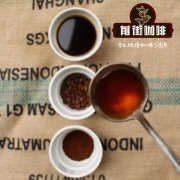Analysis on the mixed situation of Essel Coffee Bean varieties _ the reasons for the complexity of taste and flavor of Ethiopian coffee beans

Professional coffee knowledge exchange more coffee bean information please follow the coffee workshop (Wechat official account cafe_style)
If you are very fond of African beans, it should be easy to find that Ethiopian beans are generally of different sizes and have significantly lower evenness than those in Kenya. Whether it is Yega Xuefei or Sidamo, whether it is washing or sunlight, sometimes the same batch of coffee beans can be seen to be significantly different in baking color and particle size.
●: why are Ethiopian coffee beans always big and small? ]
Regular Ethiopian coffee drinkers should have heard of the [Heirloom native species], most Ethiopian varieties will be named after this name, in fact, because there are so many Ethiopian varieties, it is like the natural gene bank of Arabica, on the one hand, there are many varieties, and it is difficult to identify and classify them, on the other hand, the Ethiopian government is reluctant to disclose these species information for the sake of protection, so it is collectively called [Heirloom native species].
● first, let's take a look at how Ethiopian coffee beans are grown and picked.
Generally speaking, coffee farmers may grow multiple varieties at the same time, or they may pick out the better varieties and sell them. In particular, Ethiopia, where coffee is mostly wild or semi-wild, grows in fields, backyards or under forests, and what coffee farmers receive is actually a large platter of many different natural varieties.
Wild coffee trees like to grow at the bottom of the forest. The tree species that can shade coffee is called "Shade Tree, or Shadow Tree"; such a planting method is called "Shade-grownCoffee". The advantage is that it can reduce the impact on the ecology, and a variety of organisms will also help to suppress diseases and insect pests. In some areas, bananas and other local food crops are used to shade coffee.
Nearly 2000 coffee varieties have been recorded in Ethiopia, including 1927 native varieties and 128 imported varieties. So just by looking at the appearance, Esther's coffee variety is "Grand View Garden", which has everything, long, short, thin, fat.
[long granules] are found in all coffee growing areas in Ethiopia. From the actual proportion seen, there are more varieties of long granules in the western Jimma, including Limmu and Kaffa, and less in sidama (Sidamo) or yirgacheffe (Yega Chuefei).
[small particle species] the appearance is relatively round, the bean body is very small, mostly between 14-15 orders, this variety should be the most familiar to us, in Sidamo and Yegashiri can often see their figure, I have also seen in a harrar sample, also seen in Jimma local sales of coffee beans, compared to other regions, sidama and yigracheffe and surrounding arsi, guji have more native varieties of this small particles.
In addition to the wide variety of coffee, the way coffee is grown also affects the variety mix of Ethiopian coffee beans. )
Ethiopia's coffee cultivation is divided into:
● forest coffee forestcoffee (8-10%), coffee trees and other crops coexist in the primeval forest, without any artificial care, farmers will pick coffee fruits regularly.
● forest-semi-forest coffee semi-forestcoffee (30-35%), the coffee planting area is between the forest and the range of farmers' lives, coffee trees are naturally produced varieties like forestcoffee, and farmers will manage coffee planting areas and grow other cash crops.
● pastoral coffee gardencoffee (50-55%), coffee trees are planted around farmers' living areas, and most of them are grown by farmers themselves.
● plantation coffee plantationcoffee (5-6%), a large private grower, has more treatment facilities and production capacity.
Most of the coffee cultivation in Sidamo and Yega Xuefei belongs to the pastoral coffee model, in which coffee farmers plant coffee trees near their living areas and harvest them during the harvest season. it is then sent to a nearby treatment plant built on water for unified treatment (or purchased by a middleman). In addition to a small number of plantations that have the strength to grow, pick and handle raw coffee beans independently, many coffee beans from different regions and varieties will be centrally processed by the processing plant and then sent to the auction house for official evaluation and grading.
This is one of the reasons why many Ethiopian coffee beans are named after processing plants or cooperatives, and it is also one of the reasons why the same batch of coffee beans are mixed with multiple coffee varieties. even the flavor of different batches of coffee beans produced by the same treatment plant will be significantly different.
● Essel Coffee Bean brand recommendation
Qianjie Coffee freshly roasted single Essel beans-such as Yega Sheffield and Sidamo Coffee are fully guaranteed in brand and quality and are suitable for brewing in a variety of utensils. And more importantly, the performance-to-price ratio is extremely high, a bag of half a pound 227 grams, the price is only 70-90 yuan. According to the calculation of 200ml per cup of coffee and the ratio of powder to water at 1:15, 15 cups of fine coffee can be made in a bag, and each cup of coffee only costs about 5 or 6 yuan, which is very cost-effective for cafes to sell dozens of yuan a cup.
Qianjie coffee: Guangzhou bakery, the store is small but a variety of beans, you can find a variety of unknown beans, but also provide online store services. Https://shop104210103.taobao.com
Important Notice :
前街咖啡 FrontStreet Coffee has moved to new addredd:
FrontStreet Coffee Address: 315,Donghua East Road,GuangZhou
Tel:020 38364473
- Prev

Is the price of Ethiopian coffee beans expensive? introduction of Ethiopian coffee beans. Is Ethiopian coffee good?
Professional coffee knowledge exchange more coffee bean information please follow the coffee workshop (Wechat official account cafe_style) ● Essex coffee bean story Ethiopia is located in a country full of wonders, where all Arabica coffee comes from. The Kaffa Forest is the beginning of everything. Kaffa is located in the southwest of Ethiopia. Centuries of natural progress in Kaffa
- Next

Comparison of taste and flavor of different Esser coffee beans _ how much is a pack of Essel coffee beans
Professional coffee knowledge exchange more coffee bean information please pay attention to the coffee workshop (Wechat official account cafe_style) Essex coffee beans in the large particles and small particles in the flavor difference? In order to verify this problem, the editor decided to pick two sets directly and compare them. Take the washing of Sidamo G1 as an example, the coffee beans with obvious differences in size are selected, and the same brewing ginseng is used.
Related
- Detailed explanation of Jadeite planting Land in Panamanian Jadeite Manor introduction to the grading system of Jadeite competitive bidding, Red bid, Green bid and Rose Summer
- Story of Coffee planting in Brenka region of Costa Rica Stonehenge Manor anaerobic heavy honey treatment of flavor mouth
- What's on the barrel of Blue Mountain Coffee beans?
- Can American coffee also pull flowers? How to use hot American style to pull out a good-looking pattern?
- Can you make a cold extract with coffee beans? What is the right proportion for cold-extracted coffee formula?
- Indonesian PWN Gold Mandrine Coffee Origin Features Flavor How to Chong? Mandolin coffee is American.
- A brief introduction to the flavor characteristics of Brazilian yellow bourbon coffee beans
- What is the effect of different water quality on the flavor of cold-extracted coffee? What kind of water is best for brewing coffee?
- Why do you think of Rose Summer whenever you mention Panamanian coffee?
- Introduction to the characteristics of authentic blue mountain coffee bean producing areas? What is the CIB Coffee Authority in Jamaica?

